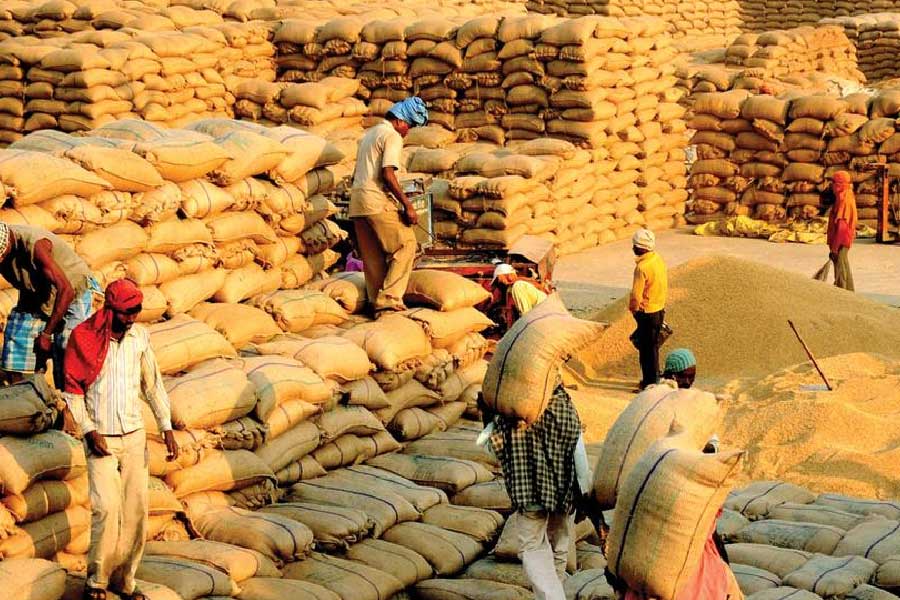Government should encourage contracts by groups of farmers
Prof. C. S. C. Sekhar, Institute of Economic Growth agrees that as contract farming ordinance comes into play, a single small farmer will always be at a disadvantage vis-à-vis a large buyer. The government should encourage agreements by groups of farmers and FPOs so that their interests are protected.

IBT: What is your view on how the three bills – “The Farmers Produce Trade and Commerce (Promotion and Facilitation) Ordinance, 2020” “The Essential Commodities (Amendment) Ordinance, 2020”, and The Farmers (Empowerment and Protection) Agreement on Price Assurance and Farm Services Ordinance, 2020 will impact the Indian agriculture sector?
Prof. C. S. C. Sekhar: These reforms have been long-overdue and the need (for these) has been felt for a very long time. They are expected to benefit farmers if implemented well in the right spirit by the states and the Centre. The small and marginal farmers are largely excluded from the operation of APMCs. A number of committees and commissions in the past felt that the APMCs have become highly inefficient and needed urgent reforms. Recently the Parliamentary Standing Committee on Agriculture 2018-19 also observed that the APMC markets across the country are not working in the interest of farmers due to various reasons such as limited numbers of traders in APMCs markets, thereby reducing competition, cartelization of traders, undue deduction in the name of market fee, commission charges etc.
The three bills introduced in Parliament recently are attempts to address some of these problems.
The Farmers Produce Trade and Commerce (Promotion and Facilitation) Bill, 2020 seeks to create more options for the farmers to market their produce by relaxing the earlier requirement that all the marketed produce be routed only through the local APMCs. Farmers are now allowed to sell to any buyer outside the premises of the APMC markets and even outside the state.
At the same time, the bill seeks to continue the APMC system, since the APMCs still perform some important functions and also facilitate procurement by the FCI and other government agencies. Thus the present bill creates an additional channel for farmers and does not seek to dismantle the mandi system, as is being feared by some.
The other important problem facing the farmers is the non-availability of market outlets and uncertainty of price at the time of harvest. The Farmers (Empowerment and Protection) Agreement on Price Assurance and Farm Services Bill, 2020 seeks to address this issue by allowing farmers to enter into contracts with traders, processors or exporters. Two types of agreements are envisaged under this.
- Trade and Commerce Agreement, where the ownership of the commodity remains with the farmer during production and he gets the price of produce on its delivery and
- The production agreement where the sponsor (party other than the farmer) provides farm services, and bears the risk of output and makes payment to the farmer for the services rendered by him/her. A minimum price, quality, mode of payment, delivery etc are to be specified in the agreement.
The third bill, The Essential Commodities (Amendment) Bill, 2020, attempts to remove undue restrictions on operations of the private sector. The bill seeks to limit the power of the government to impose restrictions on trade and stocking by the private agents only in case of war, famine, natural calamities and steep rise in prices. This bill is expected to attract private investment into agriculture and benefit cereals, pulses, oilseeds, potato, onion sectors where private participation has been severely shackled so far.
IBT: Some political parties and analysts have cautioned that the farm bills would lead to massive corporatization and be inimical to the interests of farmers. What is your perspective on these concerns?
Prof. C. S. C. Sekhar: The key is implementation. It is very likely that individual farmers will be vulnerable and may not be able to get a fair deal vis-à-vis the large companies. The government needs to encourage farmers to enter into agreements in groups and not individually. The government also needs to oversee the agreements and ensure that the minimum guarantee price provision, which is contained in the bill, is properly complied with. Also, it is important to ensure that this minimum price is not lower than the market price or some benchmark price such as the APMC mandi price. However, some critics are apprehending that farmers will be dispossessed of their lands and the lands will be taken over by the large companies. This is not possible since the bill has forbidden that any clause in the agreement to be linked to farmer’s land.
IBT: A major fear being cited is the possible removal of the MSP regime? How have the MSP provisions fared for farmers over the years? Do you think the same support is sustainable and viable in future as well? Why or why not?
Prof. C. S. C. Sekhar: As has already been mentioned above, the bill only seeks to create an additional marketing channel for farmers and does not dismantle the mandi system. There is a clear demarcation of the area of operation under the bill and the jurisdiction of APMC. Under the Bill, farmers can market only in an area called the ‘trade area’. This trade area falls outside all the markets and mandis under the jurisdiction of APMCs. The bill does not lay down any stipulations explicitly or implicitly regarding the operation of APMCs.
As for the continuance of MSP and procurement, the government has made it clear at the highest level that the MSP and procurement operations will continue. That should allay many of the apprehensions of farmers. Also, there is a large array of programs involving MSP or/and procurement such as PSS, PDPS and PPSS programs. There are specialized institutions implementing these policies such as FCI, NAFED, CCI etc. There is a vast network of public distribution system (PDS), which is totally dependent on public procurement of foodgrains. The recently launched free grain distribution programs like PMGKY have also become possible due to the large stock of foodgrains accumulated through public procurement. Thus, it will be next to impossible to even reduce MSP operations and procurement, leave alone stopping them.
It is true that the benefits of MSP-procurement system have largely accrued only to a few regions and that too limited to two/three crops like wheat, paddy and sugarcane. However, the government cannot afford to dismantle the system at present. Such a step will run counter to the objective of doubling farmers’ income and seriously jeopardize the PDS. All that the current Bill seems to be attempting is to create alternatives for those farmers who are not benefitting from MSP-procurement system and who are unable to access APMC markets for various reasons like transportation costs and other problems.
As for the viability of MSP system, that is a much larger issue and falls in the ambit of price policy. Given the present price policy, these bills seek to create alternate legal channels for marketing the farm produce.
IBT: Given that a majority of Indian farmers have marginal land, how will they be able to ensure that they produce quality produce in bulk as required by companies they sign contracts with? Will farmers have the necessary bargaining power? What are the challenges they could face vis-à-vis contract farming?
Prof. C. S. C. Sekhar: This is a legitimate concern. A single small farmer is always at a disadvantage vis-à-vis a large buyer. Ideally the Bill should have allowed agreements to be signed by only groups of farmers. Now that the bill has been introduced, the government should at least encourage agreements by groups of farmers and not by a single farmer. This will also ensure that the farmers can produce the quantities in bulk and negotiate better deals vis-a-vis the price, quality and other parameters. Initially, there should be a mechanism to ensure that the farmers get a fair deal in their agreements /contracts with large buyers. This is necessary even if this means some bit of regulation by the state for a couple of years.
IBT: One of the key criticisms against the Essential Commodities (Amendment) Bill, 2020 is that the stock limits for “extraordinary circumstances” are dependent on the agmarketnet prices and the conditions of 100% increase in retail prices for perishables and 50% increase for non-perishables are likely to be breached frequently. How can this be prevented to ensure that frequent stock limits are not imposed?
Prof. C. S. C. Sekhar: This is certainly a weak point in the Bill. The Bill mentions that stock limits can be imposed if the current price is higher (by 100% for perishables and 50% for non-perishables) than the price prevailing twelve months before or the average price of last five years, whichever is lower. Higher of these two prices, rather than lower of the two, makes more sense here if one wants to consider situations of extraordinary price rise. There is also no mention of whether the prices are real or nominal. As you have rightly pointed out, this condition is likely to be breached more often if the price considered is nominal. Also, there is no clarity whether the price refers to the average price or a price in a specific market and also whether the stock limits to be imposed are local or general. There needs to be more clarity on this, in terms of implementation.
IBT: What should the central and state governments do further to ensure that farmers, particularly small farmers, can benefit from the enhanced market opportunities and freedom of food stocking?
Prof. C. S. C. Sekhar: Farmers are unable to derive benefits from the APMCs because of various factors such as distance from the markets, lack of transportation facilities, dominance of middle men etc. A local market located close to the village is ideally suited to address these problems. The GrAM scheme (Grameen Agricultural Market scheme), under which about 22,000 weekly agricultural markets are planned for upgradation, should therefore be fast-tracked. These markets will not only allow farmers a ready access to markets outside the regulations of APMCs but will also help them in aggregating their produce for local as well as distant bulk buyers.
A robust mechanism should be put in place for wide dissemination of local prices on a daily basis so that farmers can make well-informed decisions about marketing their produce. In contract farming, groups of farmers and FPOs rather than individual farmers, should be encouraged to enter into farming agreements/ contracts. A regulatory mechanism needs to be put in place, at least for a couple of years, to ensure that the farmers get a minimum guaranteed price through the agreements/contracts and, that this price is not exploitative and is pegged to the market price.
C.S.C. Sekhar is currently Professor of Economics at the Institute of Economic Growth (IEG) and former Honorary Director of Agricultural Economics Research Centre, University of Delhi, India. He received his Doctorate in Economics from the Delhi School of Economics and Bachelor’s degree in Law (LL.B) from Delhi University. He has nearly 30 years of experience in research and teaching. His areas of teaching and research span applied econometrics, agricultural markets & price formation, international commodity markets and agri trade. He is a recipient of the Fulbright-Nehru Senior Research Fellowship in 2012-13; DK Desai Award for the best research paper in Agricultural Economics in 2003 and was a medal finalist at the GDN (Global Development Network) conferences in 2004 and 2008. He has published widely and many of his research papers have appeared in national and international journals of repute. He has been a consultant to organizations such as IFPRI, FAO, UNCTAD and Oxfam. He regularly contributes articles on contemporary policy issues to popular national newspapers.













Leave a comment